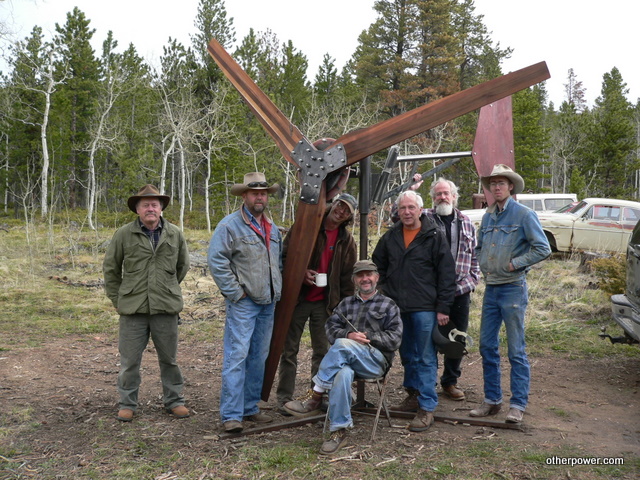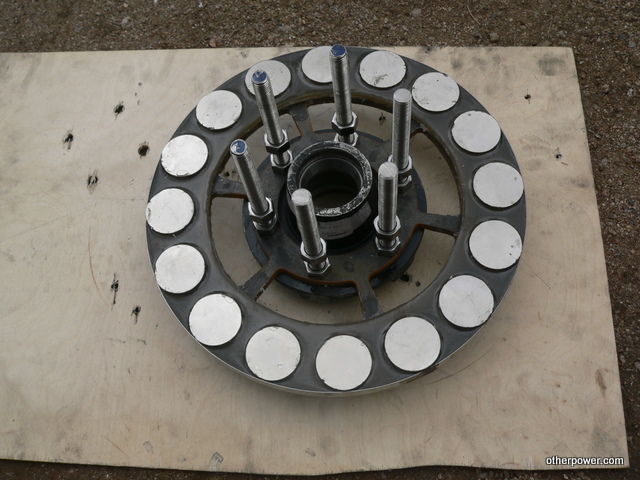For those of you who do not read the Otherpower discussion board at Fieldlines, well, you should.
Here is a recent posting about a workshop at Buckville CO. Dan Bartmann, George and Scottie guided a small group to build an ambitiously large turbine.

These are not only good stories, but also contain a lot of technical details for the latest 12 foot machines being built. “This is a 48V turbine, we wound the stator with two strands of AWG 15 wire in hand and 64 turns per coil.”, “We hit 48 Volt cutin at 125 rpm as usual.” and “In an effort to fit as much copper as possible into this stator, we wound the coils (24 volts) with 33 turns each, using 4 strands of AWG 15 wire. ”
The the 15 inch diameter rotors look lovely with their 2″ diameter, 1/2″ thick N42 neo magnets on (which cost $20 each now!)

The Otherpower design can hit a higher peak power, but my alternator will be less prone to stalling the blades.
The Fieldlines discussion board is a good place to get advice, see what works for others, and be amazed. Otherpower are the best guys at running workshops for homebrew windpower and related topics. Check their web page Otherpower.com for dates and venues.


It is a very fine windmill you have constructed and thanks for the detailed description about the alternator. I will try to make a WAVT and now I am getting parts to the alternator. But the prices for neo-magnets is very high! And now I try to investigate the posibilities for ussing ferrit-magnets instead of neo-magnets. Do you have any meaning or experiences of ussing ferrit-magnets?
Thanks, Dan for the correction. It certainly must run cool at 1000 watts. I use 2 strands of #14 gauge wire in my ‘north american’ recipe, with about 60% higher heating compared to your 4 strands of #15.
My metric version has a slightly higher cut-in (or tighter air gap, depending how I use the difference). In the metric version I use 2 strands of 1.8 wire which equates more closely to #13 wire. In this case the heating is only 28% higher. There are more options available in the metric wire sizing system so my metric ones mostly seem to have alightly lower resistance.
Either way I am comfortable at 1000 watts but there are always different margins of safety. I agree that the key to preventing overheating is conservative design rather than elaborate cooling arrangements. I just baulk at using bigger magnets and advocate larger rotor disks where necessary.
Thank you Hugh for linking to it all. I should just back this up to say *yes* – this machine as we’ve been building it seems to require an obnoxious amount of very expensive magnetic material. The ‘peak power’ as I’ve been doing it is also probably not higher, I’ve been setting them up to furl around 1kW and they seem to do that nicely.
I came to this approach just because of my paranoia about burning out I guess. I suppose that when one considers the cost of a whole system then an xtra $300 spent on magnets is not that big a deal but it is worth considering… and the cost of magnets doesn’t end at dollars, there is also an environmental cost which has to be considered.
At any rate thank you as usual for your support and helpful comments.